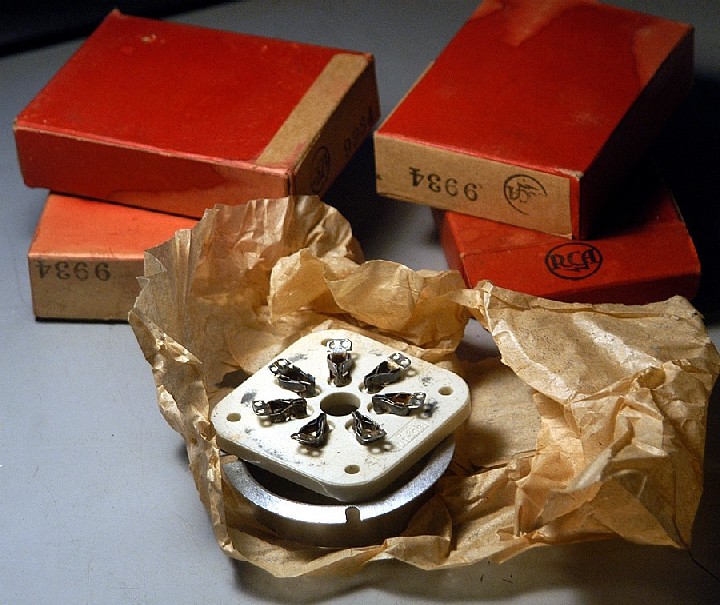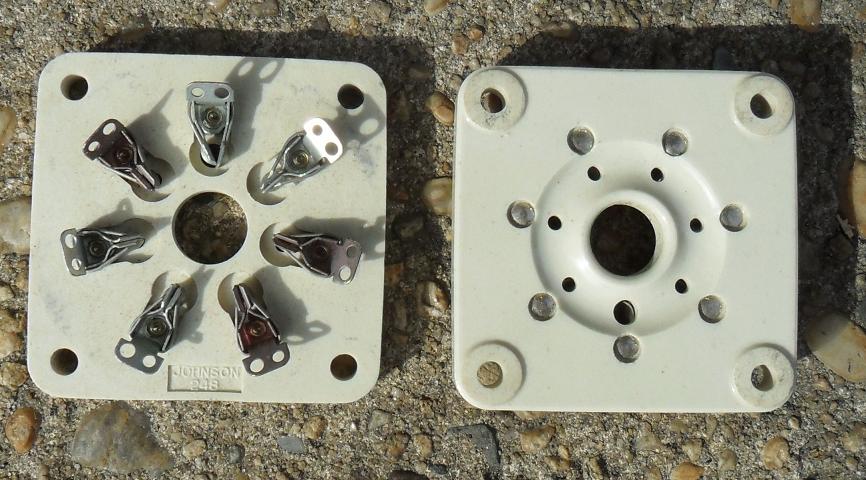|
Posted by Romy the Cat on
06-19-2005
|
This morning I went to MIT Electronics Fleamarket and found something quite fascinating: the RCA made sockets that fit 6C33C. I use Johnson’s sockets (I believe 273-275) that although are more expensive but they hold the 6C33C’s pins horizontally and do not burn the filament after a couple of years. Those RCA sockets looks similar to the Johnson’s but the have “RCA” embroiled on the socket and the metal looks 1.5 times thicker. I wonder for what they did it ...60 years ago… Anyhow, the suckers (:-) look very sexy and they will be place into the Supper Melquiades that is currently under contraction…

The caT
|
|
|
|
Posted by Romy the Cat on
03-22-2009
|
|
fiogf49gjkf0d A site’s visitor sent me a link about the $100 per socket:
http://www.jacmusic.com/sockets/html/Yamomoto.html
Despite of the semi-idiocy that is written in the promo material in the link the socket looks like the good one. I would personally would like to see a different type of socket for 6C33C – with filament cooler but it is different level of thinking. Anyhow, if you have $100 to spare per tube socket then here it is.
The caT
|
|
|
|
Posted by Paul Costa on
03-24-2012
|
|
fiogf49gjkf0d Hi Romy
Do you know the part number of the Johnson tube sockets for the 6C33. There are two sockets available numbered 247 for $35 or 248 for $30, is there a difference. Do you know.
Paul
|
|
|
|
Posted by Romy the Cat on
03-24-2012
|
|
fiogf49gjkf0d  Paul Costa wrote: Paul Costa wrote: | | Do you know the part number of the Johnson tube sockets for the 6C33. There are two sockets available numbered 247 for $35 or 248 for $30, is there a difference. Do you know. |
|
Paul, I am sorry I do not remember. I think the 30s is what I paid for mine or even more. I do not recall not the specifics of the model. You need to Google those sockets and call to the people who sell them. In my case the guy who was caring many different types of the Johnson tube sockets was able to instruct me about all questions I had – he knew his stuff. I do not remember who he was but he was one of the very few people who did care many different type of older tube sockets – so you might find him.
|
|
|
|
Posted by Paul Costa on
03-24-2012
|
|
fiogf49gjkf0d Romy
I called the seller today and they said it is the same socket, just the size and shape of the ceramic piece is different. The mounting holes are in the same place though. The metal pin contacts are the same. He spoke highly of them as customers have never returned any or complained of their quality. I assume they will be much better and longer lasting than the crap Chinese sockets Lamm sold me for $20 each.
What do you think of these by looking at this photo from the seller.

|
|
|
|
Posted by Romy the Cat on
03-24-2012
|
|
fiogf49gjkf0d Paul, I can’t say anything about it and I invest zero trust to what the seller say. The fact that he insists that “customers have never returned any or complained of their quality” does makes me horny however. The socket at your picture does have name Johnson on it and it is all that counts – no one would face the $5 worth socket if they sold 100 per year.
The truth is that the ceramic pieces are absolutely irrelevant. What is relevant is the shape of the pin contacts – something that is absolutely impossible to say from picture. The Chinese, Russian and anyone else sockets have the contacts shaped that when they embrace the tube pins then the contact surface is pretty much a single narrow point. When you put the tube in and look at the pin-contact interface behind strong light than you will see that there is a single dot where the metal of contact holds the tube pin. The Johnson and RCA contact is the same but the pin-contact interface has a shape of not single dot but a small surface. It is just a bit longer for a few mm and has slightly different angle. That is all that matters.
I use the Johnsons in Milq and for 8 years I use the amps I did not have any problems with pins. I do not mind to go to basement and to find my Johnson and RCA sockets and tell you their numbers. However, no one said that ONLY my sockets have that proper engagement of the pins. It is possible that other Johnsons models do the same. So, if I were you than I would buy from this guy one socket, get it, inspect it and compare it to the Chinese socket and if they do have property flat/cylindrical connection with the 6C33C pins then I would get as many from your seller as you need.
Rgs, The Cat
|
|
|
|
|
|
|
Posted by Romy the Cat on
05-25-2014
|
|
fiogf49gjkf0d A truly wonderful idea. The heater are in on anode and both filament it looks like wonderful. Now the question that I have to ask: would it possible that such large heatsink would act as antenna and would pitch up dirt from the amp?
|
|
|
|
Posted by decoud on
05-25-2014
|
|
fiogf49gjkf0d These look like the absurdly expensive Yamamoto soundcraft teflon version, which I have used, and which do not work because the receptacles for the pins are shaped so that there is only a single point of contact when the pins go in. So the heaters periodically cut out. Whether or not the heatsinks here would help I do not know, but the pin receptacle construction is definitely flawed in the first place. As I recall, Jessie had this problem too.
I think the most elegant solution would be to use copper heatpipes as the conducting elements, linked to a heatsink that can then be placed in an electromagnetically quiet area...
|
|
|
|
Posted by Paul S on
05-25-2014
|
|
fiogf49gjkf0d What problems with the Johnson sockets are these trying to solve, again? Would they really be better overall than a lower mass design along with chassis through-holes, like the ML2, etc.? If a reader is using these, do they appear to better stabilize the tube's operation or extend its life? We already heard from Jessie regarding the issues with "similar" contact points, not to mention the (potential) deformation issues with Teflon. I also immediately saw the "fins" as antennae...
Paul S
|
|